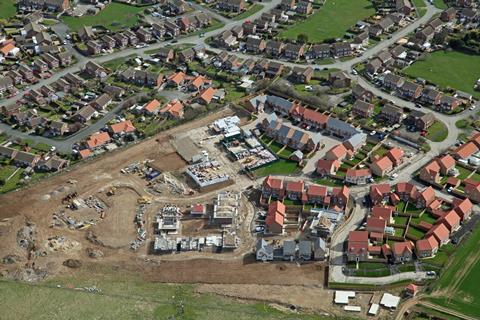Local authorities want to levy council tax on homes granted planning but not built out
Council leaders have called for new powers to charge developers council tax on unbuilt homes in order to encourage them to build out planning permissions more quickly.
The Local Government Association (LGA) said it wanted the government to include new powers for councils to tax developers in the forthcoming planning Bill, which is expected to form a key part of the Queen’s Speech tomorrow.

The LGA said councils should have the ability to levy council tax on homes that have been permissioned, even if not built out, from the point at which the permission expires.
The body, which represents all of English local government, made the call as it issued updated figures which it claimed showed that more than 1.1m homes granted permission over the past decade remained unbuilt.
The LGA has long claimed that the planning system is not a barrier to development, contradicting claims by many housebuilders. It says that the volume of unbuilt permissions demonstrates there is no shortage of sites available to build on.
The LGA said 2,782,300 homes have been granted planning permission by councils since 2010/11, but that only 1,627,730 have been built over the same period. In recent years the the number of homes built per annum has increased sharply, with nearly 244,000 homes added to the housing stock in 2019/20, prior to the pandemic.
However, the LGA claims the increase in construction has not kept pace with an even faster growth in permissions being granted.
Cllr David Renard, the LGA’s housing spokesperson, said: “It is good the number of homes built each year is increasing. But by giving councils the right powers to incentivise developers to get building once planning permission has been granted, we can go further and faster.
“This is why we need the Queen’s Speech to deliver the reform needed to enable councils to tackle the housing crisis.”
The LGA claimed that the ability to levy council tax on unbuilt sites would also make it easier to exercise compulsory purchase powers where councils wanted to assemble land for redevelopment.
The call was backed by CPRE, the countryside campaign group. Tom Fyans, its campaigns and policy director, said the government needed to bring in a “use it or lose it” approach to planning permissions to “force developers to build homes on land already allocated”.
He said: “Today’s figures are just the latest atop a mountain of evidence that planning permissions and the availability of land are not holding up the delivery of homes – rather it’s the developers slowing down building rates to keep house prices high and maximise their profits.”
However, Joshua Carson, head of policy at advisory firm Blackstock Consulting, said the plan would be counterproductive as it would be “unduly antagonistic” towards the housebuilding industry, and that “enduring co-operation with councils” was necessary to achieve a consistent supply of new homes.
He said: “The notion of developers ‘sitting on planning permissions’ has been taken out of context. It takes a considerable length of time to agree the provision of new infrastructure on strategic sites for housing and extensive negotiation with councils to discharge planning conditions before homes can be built.”
The news came amid press reports over the weekend that prime minister Boris Johnson is set to use the Conservative Party’s strong performance in local elections as a mandate to push ahead with radical planning reforms first laid out last summer.
The Times said that Conservative Party strategists viewed increasing home ownership as key to cementing gains in recent elections in former Labour strongholds, and that liberalisation of planning rules was the way to achieve that.
The paper reported that proposals last August to force councils to classify all land as either for “growth” or “protection” were likely to form part of the Bill, with areas zoned for growth given automatic outline permission. However it said that ministers were divided on whether to include a third category – “renewal” – in the new system. Planning rules in this zone would remain similar to those in place today.











No comments yet